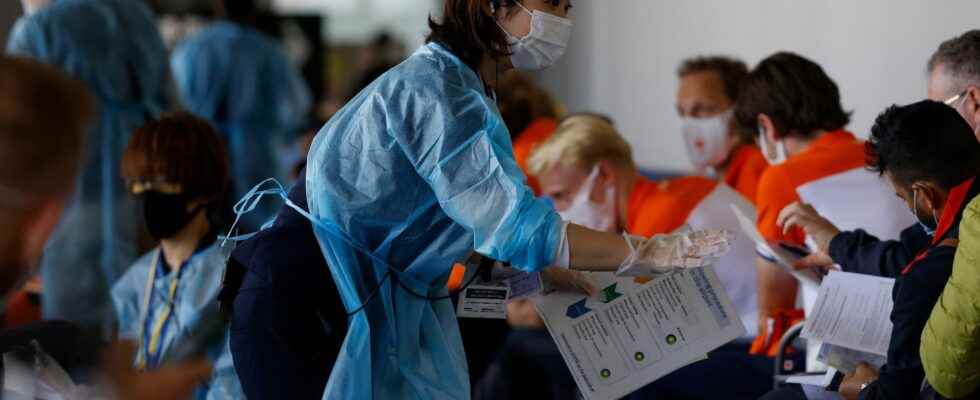The world is looking for a compass in the face of the lifting of health restrictions in China. As the country faces a new wave of contamination, risking the formation of new variants, the rest of the planet is considering what to do next. Among the questions on the table: the usefulness of mandatory tests for Chinese travelers. Several countries including Italy or Japan, as well as the United States, have already decided to impose this protective measure. This Friday, the Spaniards followed suit.
Choices deemed “understandable” in view of the lack of information provided by Beijing, said Thursday the head of the World Health Organization (WHO), Tedros Adhanom Ghebreyesus. “In the absence of complete information from China, it is understandable that countries take the measures they believe will protect their people,” he said on Twitter, urging Beijing to communicate more about the situation. state of the pandemic in the country.
“In order to be able to carry out a full risk assessment of the Covid-19 situation in China, WHO needs more detailed information,” he wrote. Same story on the side of Antoine Flahault, director of the Geneva Institute of Global Health interviewed by TF1info : “It is very important to maintain good health monitoring, in particular to carry out PCRs within the Schengen area for all travelers from China. On France InterBrigitte Autran, president of the Committee for monitoring and anticipating health risks, estimated this Thursday morning that “the only potential interest” was based on systematic sequencing in the event of a positive result.
Indeed, screening would give an indication of the number of people carrying the Covid-19 virus, because the data from Beijing is incomplete. “The most important thing would be better transparency from the Chinese authorities on the number of cases and the variants that are circulating in China”, indicates to The Express Yannick Simonin, professor of virology at the University of Montpellier. For its part, Beijing says that Chinese data on the number of deaths from Covid-19 has always been transparent, despite a discrepancy with the reality of the statistics.
A difference in immunity between Europe and China
For the time being, the variants which seem to be most present in China (including BF.7) have already been circulating in France, at low levels, for several months. So far, they have failed to establish themselves in Europe or the United States. “As long as its variants remain in the Omicron family, even with ever greater transmissibility, there is little chance that they will manage to leave China and become dominant in other countries”, confirms to L’Express T Ryan Gregory, an evolutionary biologist at the University of Guelph in Canada. The main risk relates to the appearance of a new variant, even if nothing indicates that it would be more transmissible or virulent. One thing is certain: it will be difficult to stop him. “The measures that would be put in place in other countries could only slow down its arrival, but not prevent it”, assures Yannick Simonin, professor of virology at the University of Montpellier.
And if a new variant were to appear in China, it could experience difficulties on the Old Continent, which has been crossed by a succession of waves since 2020. “China and Europe have radically opposite situations. A variant that is actively circulating in Beijing would have more difficulty spreading to its European neighbours, for which the rate of natural protection and vaccination is much higher”, underlines Yannick Simonin. Europe has very well vaccinated its elderly people and those at risk of a serious form, which is not the case for the Chinese population. To date, 60% of Chinese people over the age of 70 have not received their three doses of the vaccine. In addition to the failure of the vaccination campaign, the Middle Kingdom is experiencing a low rate of vaccination and natural infection.
An argument taken up by the health authorities in Brussels. EU countries “have relatively high immunization and vaccination levels” and “variants circulating in China are already circulating in the EU,” the European Center for Disease Prevention and Control (ECDC) said in a statement. a press release, explaining that such a measure is not necessary at the level of the European Union as a whole. For the European agency, “the potential infections” that can be imported are “rather low” compared to the number of infections already circulating on a daily basis. Health systems “are now able to manage” the disease, she added.
The European Commission had convened an informal meeting on Thursday to “discuss […] possible measures for a coordinated approach” by EU states to the explosion of Covid cases in China. The Commission will “continue to facilitate discussions between member states”, said a spokesperson after the meeting without further details. However, the situation could change, especially if new variants seem to emerge. For the moment, it is too early to “imagine dramatic scenarios”, concludes Yannick Simonin.
